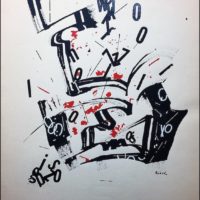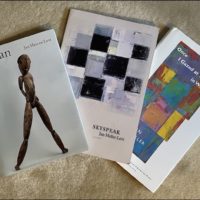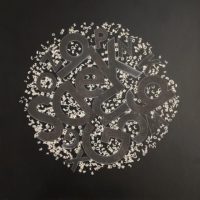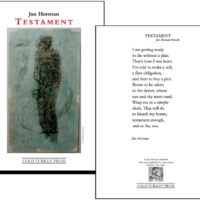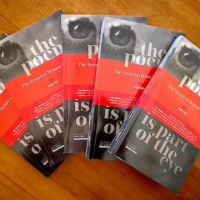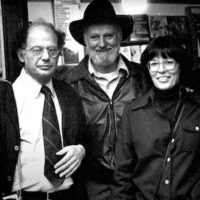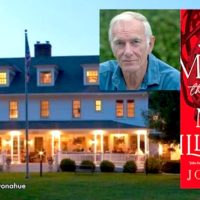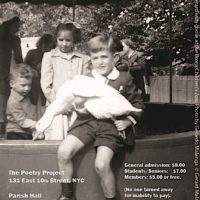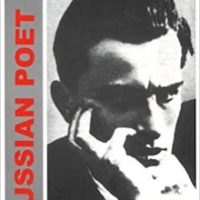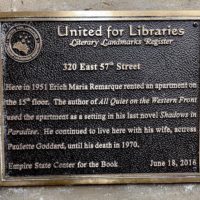‘vuv’ was published in the little magazine Earthquake in 1967. The untitled piece was never published. James Horton discovered it in Carl Weissner’s Klactoveedsedsteen archive at the Harry Ransom Center, University of Texas at Austin.
Essential Reading Signaled in the Night Sky
The Flower Moon, seen over Byron Bay, Australia, on May 6, was a reminder of David Grann’s riveting ‘KILLERS OF THE FLOWER MOON: The Osage Murders and the Birth of the FBI,” which is essential reading to understand the history of America’s marauding westward ‘progress’.
Too Funny to Forget
Christopher Hitchens Would Be Chortling
And the staff here hopes, so will you.
High Market Value of a Modern First Edition Fills a Void
A pre-owned, first edition copy of Necrophilia Variations sold yesterday on eBay with an asking price of $2,000. The author, who goes by the name Supervert, is embarrassed to brag about it. Although it wasn’t Supervert who sold it, and he doesn’t know who did, he tells me, “Market value helps fill the vacuum of feedback we writers are treated to.”
Gazing in Wonder at Jan Heller Levi
IIt’s hard to say what is most memorable about the poems in these three collections—”orphans,” “Skyspeak,” and “Once I Gazed at You in Wonder”— because it means having to choose between their emotional impact and their marvelous candor, to say nothing of their literacy, intimacy, humor, and intelligence.
Mustill’s Big Bang
Exploding the Alphabet via Poésie Concrête
The explosion grows . . . and the letters disperse.
What Does It Mean to Prepare for Death?
I don’t have a terminal disease, unless it’s called old age. . . . But there’s always this to consider: being ready to die is an illusion.
Poetry Comes First
Large Menu from Bite-Sized Books
The first volume in a projected series called The Return to Reason has been released by the British publisher Bite-Sized Books Ltd. The stated aim of the volume, titled ‘The Poem is Part of the Eye,’ is “to draw new readers towards poetry they may not be familiar with or have not previously engaged with at all.”
Kleine Tiere / Small Animals — A Bilingual Edition
These poems have been called “tears for the tongue,” “dark diamonds,” and “sonnets of experience” that William “Blake himself would favour.” (MÜ Magazine, London).
Stadtlichter Presse also publishes an elegantly produced series of books called Heartbeats, which is devoted to American Beat and post-Beat poets and writers. Each book presents the original poems or prose with the German translations on facing pages. There are now more than three dozen in the series.
Nancy Peters Saved City Lights Books, Yes!
“While Lawrence Ferlinghetti certainly deserves all of the accolades he’s received, the fact of the matter is there would literally be no City Lights without Nancy Peters. Beyond shepherding City Lights through various fiscal crises and providing the steady anchor that allowed Ferlinghetti to travel the world as a poet and activist, Nancy’s vision as an editor and acumen as a publisher were a vital key to the success and longevity of City Lights Publishers.”
The Eloquence of Erich Maria Remarque’s Last Novel
After reading the prologue, tell me you’re not drawn into this refugee’s tale:
“Behind me lay a long and perilous road, the Via Dolorosa of all those who had fled from the Hitler regime. … Even after leaving Germany we were not safe. Only a very few of us had valid passports or visas. When the police caught us, we were thrown into jail and deported. Without papers we could not work legally or stay in one place for long. We were perpetually on the move.”
Jamie MacGillivray: The Renegade’s Journey
John Sayles Talks About His New Novel and a Lot More
Earlier this month he was at The Poisoned Pen Bookstore in Scottsdale, Arizona. Next stop Wednesday, March 15, in Salisbury, Connecticut.
Malanga to Make a Rare Combo Poetry-Film Appearance
Anyone who has seen the 1954 movie “Friendly Persuasion” might wonder if Gerard Malanga was the precocious child actor cast for comic relief with a pet goose that keeps chasing him around the family farm.
Of course he wasn’t. That was Richard Eyer. Malanga is the noted poet and photographer who once was part of Andy Warhol’s inner circle.
Elsa Triolet on Mayakovsky’s Precious ‘Poetic Reserves’
Elsa Triolet’s short memoir of Vladimir Mayakovsky gives both an intimate view of the man and a broader sense of the stature he enjoyed in his time. What intrigued me most, however, was the chapter about a little book he wrote, “How Verses Are Made.”
Small Animals / Kleine Tiere
‘Great beauty from great despair unbends the mind. Achieved or not, that is every poet’s goal.’
Erich Maria Remarque
All Quiet on East 57th Street
Now that the German-language adaptation of Erich Maria Remarque’s famous 1928 antiwar novel “All Quiet on the Western Front” has won best picture at the British equivalent of the Oscars, the staff here thought it worth noting that Remarque lived for the last 20 years of his life neither in Germany nor the UK but on Manhattan’s East Side.
David Erdos: ‘The Batchelor’s Promise’
‘Brutally Honest, Brave, Possibly Foolish . . .’
‘Death is divorce in its most basic sense …
This is how it was with my parents
Who when I was 15 split apart
Bound by the need to move on
Despite the connection between them …’

